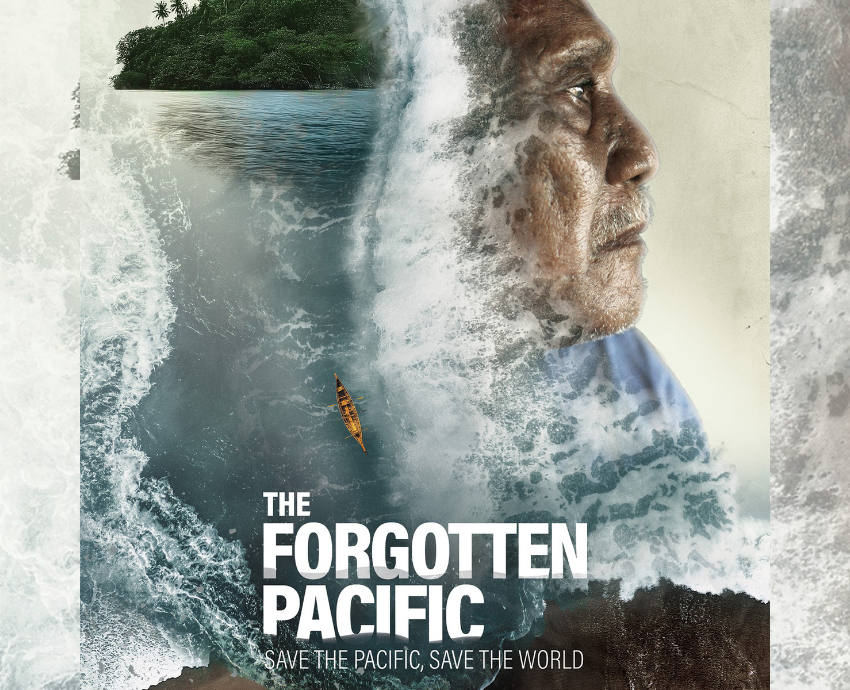
The Forgotten Pacific
Directed by Elizabeth Koroivulaono
Edited by Laura Macbeath
Narrated by Suluafi Brianna Fruean
A Tiki Lounge Production
Free screening on The Coconet TV and YouTube
“We’re not drowning, we’re fighting!” is a key theme of the Pacific Climate Warriors depicted in The Forgotten Pacific, an important new documentary film screening on The Coconet TV.
The film sheds light on how island communities are weaving indigenous knowledge with modern solutions to adapt, rebuild and protect their homelands from the devastating impacts of climate change.
Narrated by Pacific climate leader Suluafi Brianna Fruean, the film takes viewers on a journey across five Pacific islands — Fiji, Tuvalu, Vanuatu, the Republic of the Marshall Islands and Samoa — to hear how everyday people are fighting for their homes and culture.
While contributing a miniscule amount to global carbon emissions, the film explains that Pacific Islands are “bearing the brunt of the climate crisis”.
Tuvalu is a “sinking island”, where “the land is shrinking, extreme drought prevails, and water is a precious commodity. Rising sea levels are consuming the people's ancestral lands.” The islanders are planting mangroves as a partial defence against the increasing king tides.
One activist says early on in the film: “We are all connected; ocean, land, people. If Tuvalu goes down, so does the world.”
Tuvalu has signed a security agreement with Australia, which provides for “defence support” in return for a migration policy allowing for 200 islanders a year to move to Australia. “This migration agreement is fraught with problems,” the film says.
Fiji is a collection of 300 islands “deeply connected to the ocean. Coral bleaching, caused by warming of the oceans, is a major problem in the Pacific.”
Action is taking place in Fiji and elsewhere to tackle bleaching on the surrounding coral reefs. The film shows scientists and others in Fiji collecting bleached corals and regenerating them in special nurseries.
The Marshall Islands, a US-controlled territory, faces the additional threat of toxic nuclear waste, arising from the US government’s testing of nuclear bombs in the area during the 1950s. “We now have one of the highest cancer rates in the world,” the film narrator notes.
The US put nuclear waste in the ground, covered by a large concrete dome. Now, with the sea rise, “the concrete is leaking”.
“For the Marshallese, enough is enough!”
Vanuatu is in “the front line of climate change,” the film states. A huge cyclone that struck the islands last year left massive devastation.
“The cyclone changed everything: houses damaged, shortage of food, roads and pathways destroyed.” People are shown re-building a wrecked roadway, using new materials to re-construct houses and making canoes for fishing.
“We are now being forced to adapt to the new reality with new techniques, and to promote sustainable futures for ourselves,” an islander emphasises.
Green Left’s Coral Wynter spoke by phone to the film’s director/producer Elizabeth Koroivulaono in Aotearoa/New Zealand.
Koroivulaono travelled widely around the Pacific to interview people for the film, which presented some challenges.
Wynter asked Koroivulaono what message she wanted to convey, the challenges in making the film and how it has been received.
“I always wanted to make sure the message of the film was of the hope, strength and resilience of the Pacific communities,” said Koroivulaono.
“The most difficult aspect was to fit in everyone’s comments. I had to pick the gold out of the interviews. There were so many wonderful talks.
“It was also hard to separate the emotion and feelings from the facts of climate change, the sea levels rising so fast and what is happening to the islands.”
“I started [the project] 10 years ago, in 2014, with the concept. When we were ready to shoot, it was all stopped in 2019 with COVID.
“It was released in September this year. The overwhelming response has been one of enjoyment. The subject of the film is easy to digest.
“The Pacific communities loved seeing each other on the screen, which rarely happens. The peoples of the Pacific Islands all talk to each other, but the small islands — those of Vanuatu and the Marshall Islands — are hardly ever represented on film.
“The film has been seen in Germany, England, the US, Philippines and all over the Pacific.”
The film explains that the Pacific Island Climate Warriors are made up of 19 teams and 1100 volunteers.
“Our goal is now the creation of an international Fossil Fuel Non-Proliferation Treaty. This would be a big win for the Pacific Islands, as strong advocates for ambitious climate action,” the film stresses.
“Pacific climate action is important now. Together we can push our demands over the line,” the narrator notes. “This is not the end, but just the beginning.”